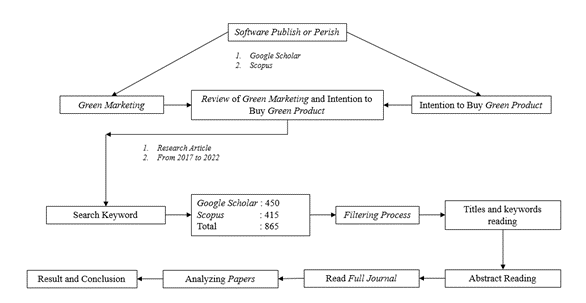Green Marketing and Intention to Buy Green Product: Systematic Literature Review
DOI:
https://doi.org/10.12928/si.v21i1.103Keywords:
Green Marketing, Green Product, Purchase Intention, Systematic Literature ReviewAbstract
Society in the current period is facing various kinds of challenges and obstacles related to the acceleration of urbanization and industrialization. As for the problems at the moment, namely the health crisis and pollution that can threaten the present or future generations so that action is needed to ensure optimal living conditions, it is becoming increasingly important to understand green marketing and various other forms of support. Therefore, the aim of this research is to carry out a systematic review of the literature to identify several factors that influence green marketing. For this study, the method used was a Systematic Literature Review (SLR) which was carried out by following the procedure and followed by a meta-analysis to see the relevance of the published articles. This study uses VOSViewer as auxiliary software and uses Publish or Perish to help group data. From the search results, a total of 865 related articles were found for 2017-2022 and sorting was carried out to find relevant articles. The literature review was carried out using qualitative analysis, which resulted in four keywords; green marketing mix, attitude, purchase decision, and green marketing. In the end, we propose a framework that is developed based on some of the findings obtained. It is hoped that this framework can be used for a better understanding of green marketing factors that influence consumer purchase intentions.
References
Amberg, N., & Fogarassy, C. (2019). Green consumer behavior in the cosmetics market. Resources, 8(3), 137. https://doi.org/10.3390/resources8030137.
Astuti, R., Deoranto, P., Wicaksono, M. L. A., & Nazzal, A. (2021, April). Green marketing mix: an example of its influences on purchasing decision. In IOP Conference Series: Earth and Environmental Science. 733, 1, 012064. IOP Publishing. https://doi.org/10.1088/1755-1315/733/1/012064.
Awan, U., Kraslawski, A., & Huiskonen, J. (2018). Handbook of Environmental Materials Management. Handbook of Environmental Materials Management. https://doi.org/10.1007/978-3-319-58538-3.
Borah, P. S., Dogbe, C. S. K., Pomegbe, W. W. K., Bamfo, B. A., & Hornuvo, L. K. (2023). Green market orientation, green innovation capability, green knowledge acquisition and green brand positioning as determinants of new product success. European Journal of Innovation Management, 26(2), 364-385. https://doi.org/10.1108/EJIM-09-2020-0345.
Cuc, L. D., Pelau, C., Szentesi, S. G., & Sanda, G. (2022). The impact of green marketing on the consumers'intention to buy green products in the context of the green deal. Amfiteatru Economic, 24(60), 330-345. https://doi.org/10.24818/EA/2022/60/330.
Dabija, D. C., Bejan, B. M., & Grant, D. B. (2018). The impact of consumer green behaviour on green loyalty among retail formats: A Romanian case study. Moravian geographical reports, 26(3), 173-185. https://doi.org/10.2478/mgr-2018-0014.
Dangelico, R. M., & Vocalelli, D. (2017). “Green Marketing”: An analysis of definitions, strategy steps, and tools through a systematic review of the literature. Journal of Cleaner production, 165, 1263-1279. https://doi.org/10.1016/j.jclepro.2017.07.184.
Gurbuz, H. G., & Tekinerdogan, B. (2018). Model-based testing for software safety: a systematic mapping study. Software Quality Journal, 26, 1327-1372. https://doi.org/10.1007/s11219-017-9386-2.
Kaur, B., Gangwar, V. P., & Dash, G. (2022). Green marketing strategies, environmental attitude, and green buying intention: a multi-group analysis in an emerging economy context. Sustainability, 14(10), 6107. https://doi.org/10.3390/su14106107.
Khan, E. A., Royhan, P., Rahman, M. A., Rahman, M. M., & Mostafa, A. (2019). The impact of enviropreneurial orientation on small firms’ business performance: The mediation of green marketing mix and eco-labeling strategies. Sustainability, 12(1), 221. https://doi.org/10.3390/SU12010221.
Khanra, S., Dhir, A., Islam, A. N., & Mäntymäki, M. (2020). Big data analytics in healthcare: a systematic literature review. Enterprise Information Systems, 14(7), 878-912. https://doi.org/10.1080/17517575.2020.1812005.
Kumar, V., Rahman, Z., & Kazmi, A. A. (2013). Sustainability marketing strategy: An analysis of recent literature. Global Business Review, 14(4), 601-625. https://doi.org/10.1177/0972150913501598.
Kumari, R., Verma, R., Debata, B. R., & Ting, H. (2022). A systematic literature review on the enablers of green marketing adoption: Consumer perspective. Journal of Cleaner Production, 132852. https://doi.org/10.1016/j.jclepro.2022.132852.
Limbu, Y. B., Pham, L., & Nguyen, T. T. T. (2022). Predictors of Green Cosmetics Purchase Intentions among Young Female Consumers in Vietnam. Sustainability, 14(19), 12599. https://doi.org/10.3390/su141912599.
Luckyardi, S., Hurriyati, R., Disman, D., & Dirgantari, P. D. (2022). The Influence of Applying Green Marketing Mix by Chemical Industries; VOSviewer Analysis. Moroccan Journal of Chemistry, 10(1), 10-1. https://doi.org/10.48317/IMIST.PRSM/morjchem-v10i1.31754.
Nguyen-Viet, B. (2023). The impact of green marketing mix elements on green customer based brand equity in an emerging market. Asia-Pacific Journal of Business Administration, 15(1), 96-116. https://doi.org/10.1108/APJBA-08-2021-0398.
Patel, J., Modi, A., & Paul, J. (2017). Pro-environmental behavior and socio-demographic factors in an emerging market. Asian Journal of Business Ethics, 6, 189-214. https://doi.org/10.1007/s13520-016-0071-5.
Pradana, M., & Kartawinata, B. R. (2020). Indonesian Private University Students’ Entrepreneurial Intention. APMBA (Asia Pacific Management and Business Application), 9(2), 111-122. https://doi.org/10.21776/ub.apmba.2020.009.02.3.
Salman, D., Tawfik, Y., Samy, M., & Artal-Tur, A. (2017). A new marketing mix model to rescue the hospitality industry: Evidence from Egypt after the Arab Spring. Future Business Journal, 3(1), 47-69. https://doi.org/10.1016/j.fbj.2017.01.004.
Sukaatmadja, I. P. G. (2020). Factor affecting competitive advantage of real estate developers in Indonesia. Journal of Islamic Marketing, 12(9), 1950-1969. https://doi.org/10.1108/JIMA-01-2020-0010.
Sun, Y., Li, T., & Wang, S. (2022). “I buy green products for my benefits or yours”: Understanding consumers' intention to purchase green products. Asia Pacific Journal of Marketing and Logistics, 34(8), 1721-1739. https://doi.org/10.1108/APJML-04-2021-0244.
Tenhunen, S., Männistö, T., Luukkainen, M., & Ihantola, P. (2023). A systematic literature review of capstone courses in software engineering. arXiv preprint arXiv:2301.03554. https://doi.org/10.1016/j.infsof.2023.107191.
van Dinter, R., Tekinerdogan, B., & Catal, C. (2021). Automation of systematic literature reviews: A systematic literature review. Information and Software Technology, 136, 106589. https://doi.org/10.1016/j.infsof.2021.106589.
Walia, S. B., Kumar, H., & Negi, N. (2019). Consumers' attitude and purchase intention towards' green'products: a study of selected FMCGs. International Journal of Green Economics, 13(3-4), 202-217. https://doi.org/10.1504/IJGE.2019.104507.

Downloads
Published
How to Cite
Issue
Section
License
Copyright (c) 2023 Sri Lestari, Arfan Bakhtiar, Hery Suliantoro

This work is licensed under a Creative Commons Attribution-ShareAlike 4.0 International License.









.png)




